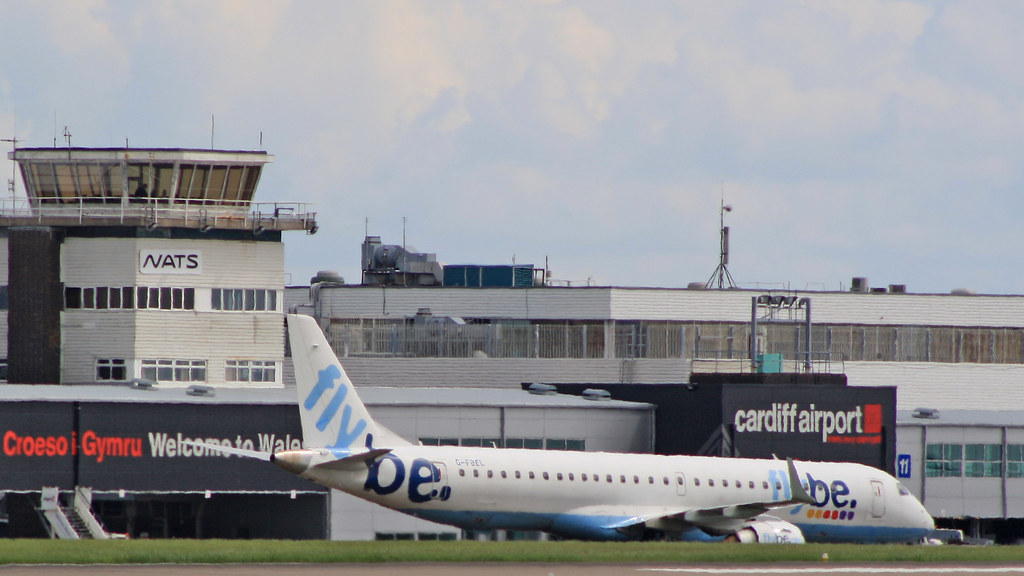Welsh Government owned Cardiff airport saw second biggest fall across the UK in passenger numbers due to Covid

The Welsh Government-owned Cardiff airport saw the second biggest fall across the UK in passenger numbers due to Covid, new figures have shown.
Passenger numbers on Covid were down 93% last year compared with 2019, second only to Southend which was down 95%. Other airports that fared badly included Gatwick (down 87%) and London City (down 86%).
Passenger numbers at UK airports last year were on average 78% below pre-pandemic levels, Analysis of Civil Aviation Authority (CAA) data found.
Just 64.4 million passengers arrived or departed on flights at UK airports in 2021, compared with 296.9 million in 2019, before the coronavirus pandemic led to a huge reduction in demand for air travel.
Trade body the Airport Operators Association (AOA) said the figures highlight how the UK’s aviation sector “suffered more than European rivals last year” due to tougher travel restrictions.
Heathrow, the UK’s busiest airport, recorded its lowest annual number of passengers for nearly 50 years in 2021, at just 19.4 million. This was a decline of 76% from the 2019 total of 80.9 million.
AOA chief executive Karen Dee said: “The CAA’s figures show just how badly UK airports were affected by the pandemic, much more so than our European competitors.
“The UK’s restrictions were more onerous and lasted for longer than those in Europe, despite our much more rapid vaccine rollout.”
‘Bumper summer’
Unlike other aspects of the pandemic, Wales, Scotland, England and Northern Ireland tended to adopt the same international travel restrictions. Quarantine hotels remained in operation in the UK for several months after they were scrapped in most other European nations, putting many people off travelling abroad.
Later in 2021, the UK was the only part of Europe requiring both a pre-departure test and post-arrival test for all arrivals, regardless of vaccination status.
The AOA said UK airports have lost £10 billion in revenue since the first coronavirus lockdown in March 2020, but those in Germany, Italy, Ireland and the US received nearly eight times as much financial support.
Ms Dee warned that the UK “cannot afford our aviation network to lag behind our global competitors”.
The “financial health” of UK airports places the country “at a disadvantage”, she said.
“That is why the UK and devolved governments should set out a comprehensive plan to recover the UK’s aviation connectivity.”
Demand for UK flights has risen this year, coinciding with the scrapping of all coronavirus restrictions for arrivals.
Heathrow recorded its busiest month since the start of the pandemic, with 4.2 million passengers using the west London airport in March.
That represented nearly an eight-fold increase on the total for the same month last year.
Tim Alderslade, chief executive of trade association Airlines UK, said: “This summer should be a bumper one and for many routes we’re seeing demand above where we were in 2019.
“But we can’t lose sight of the fact the sector has been through its worst ever crisis and it will take several years to deal with the debt airlines had to take on to make it through the pandemic with no passengers.”
He called on the Government to “focus ruthlessly” on where it can “really make a difference”, such as supporting the development of sustainable aviation fuels and modernising the UK’s airspace.
Professor Christian Rutz, from the University of St Andrews, warned that the boom in travel activity after Covid would have a damaging impact on the environment.
“As restrictions are gradually being lifted, a surge in travel activity beyond pre-pandemic levels seems imminent,” he said.
This would likely have a negative impact on the natural world, as traffic, flights, industrial and commercial activities all suddenly rise after a period of pause, leading to greater levels of greenhouse gas emissions and other kinds of pollution, he said.
Support our Nation today
For the price of a cup of coffee a month you can help us create an independent, not-for-profit, national news service for the people of Wales, by the people of Wales.






And lots and lots of wasted tax payers money
The airport has cost about £120M over the years and a commercial valuation of the Enterprise Zone was £200M a while back. Not really the point though, until we all stop all flying there is a need for the airport unless you want the air rescue service for South Wales based in your garden.
You are stumping up near £20Bn for Crossrail as a UK National Project just to get passengers to Heathrow a little quicker.The new rail station upgrade at Gatwick cost more than it took to buy and support Cardiff Wales airport in total.
Doesn’t mean it’s correct to spend money on cross rail, just because Welsh Labour squander money on an airport.
It’s disgusting how much tax payers cash has been wasted
<Come on … just one more Tim. One more bog standard troll slur and I get to call Brexiteer BINGO!>
How much ‘tax payers cash’ has gone on the airport and how much of that do you think has been ‘wasted’?
Well given the far better Covid restrictions in Cymru than next door in Chaosland, this is to be expected.
Long live Cardiff Airport.
It’s an excellent airport to fly from.
Granted it’s never going to be a Heathrow, but I’m hoping soon that KLM will be confident enough to reintroduce their 6AM flight to Amsterdam, for all those connections.
Hopefully Qatar will be back too, but I do fear that they’ve gone for good.
Cardiff airport reduces the need to travel to Bristol, but consider the money spent on Cardiff is only fraction of what is wasted on supporting the welsh language over the last 20 years.
Try getting a job in government you got no chance unless your welsh speaking, or coloured.